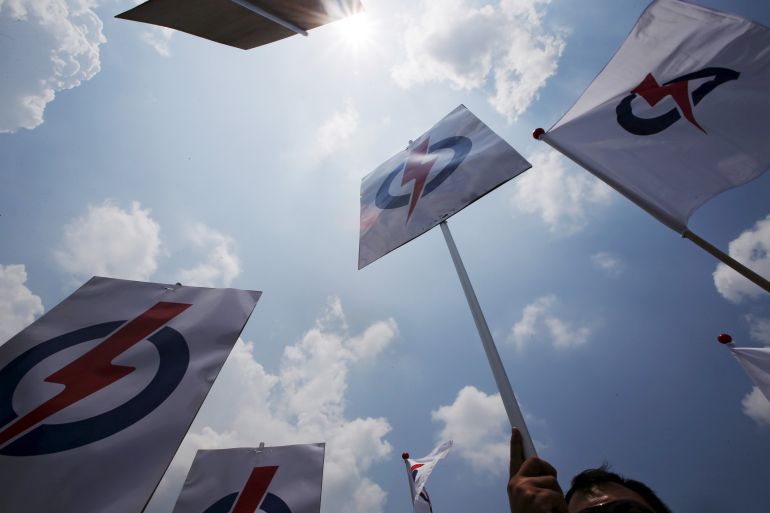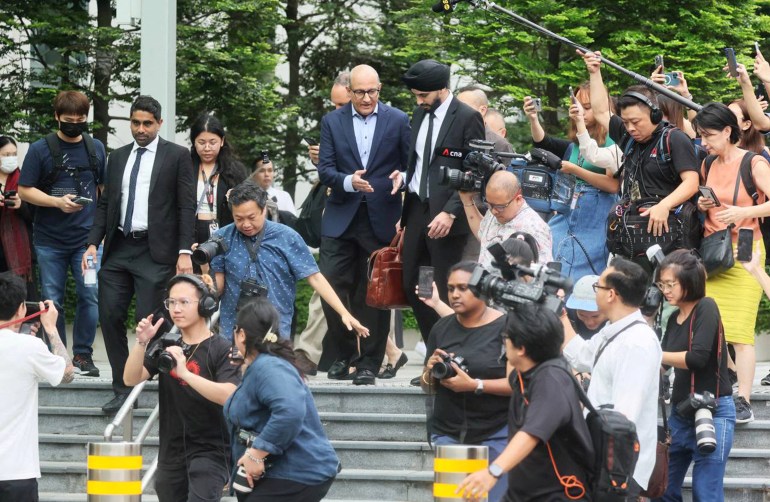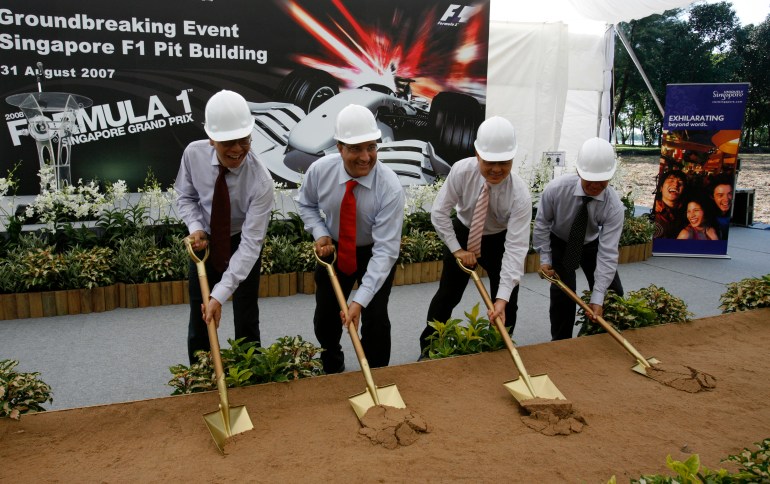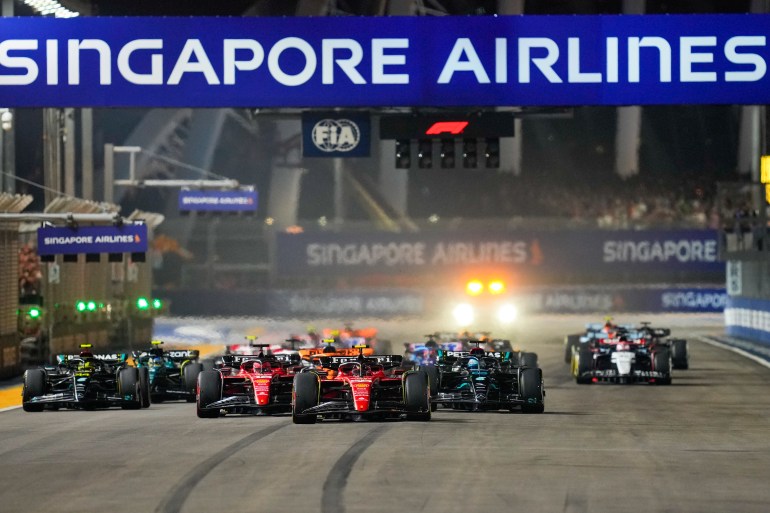‘Reputational damage’: Singapore’s ruling party grapples with scandal
The People’s Action Party, which has long traded on its squeaky-clean image, seeks to reassure voters as election looms.

Singapore – Hamilton in the West End, Arsenal vs Tottenham Hotspur at Emirates Stadium and The Curious Incident of the Dog in the Night-Time.
This might sound like the itinerary for a fun weekend in London but in Singapore, they are part of a rare corruption case involving a senior politician.
Keep reading
list of 4 itemsWhy Singapore is ‘friend of all, enemy of none’ in Israel-Gaza war
Singapore’s Lee Hsien Loong says he will step down as early as next year
Families of the executed appeal to ‘heartless’ Singapore for change
Former cabinet minister S Iswaran is alleged to have received more than 380,000 Singapore dollars ($283,000) worth of gifts from Malaysian billionaire Ong Beng Seng, including tickets for West End shows and football matches, some of them in exchange for advancing Ong’s business interests.
Ong was the driving force in bringing the Singapore Grand Prix to the city-state in 2008 and owns the rights to the night race.
Tickets to the Grand Prix were listed on the charge sheet as gifts that Iswaran allegedly received.
Appearing in court last month, Iswaran denied all 27 charges against him and later quit the government.
In a resignation letter to Singapore’s Prime Minister Lee Hsien Loong, Iswaran said he would “focus on clearing my name” and return all salary and allowances he had received since the investigation into his alleged corruption began last July.
While Lee has promised to uphold Singapore’s “reputation for honesty and incorruptibility”, the case has rocked the tiny Southeast Asian nation, renowned for its political stability.

With an election looming and a much-anticipated leadership transition scheduled for November, the People’s Action Party (PAP), which has dominated the country’s politics since independence, is keen to reassure voters that it can weather the storm.
“There is no doubt that the government has taken a hit. It has suffered reputational damage, to say the least,” said Eugene Tan, an associate professor of law at Singapore’s Management University.
“The full impact remains to be determined,” Tan added.
Hefty pay packets
Singapore’s political system has maintained a squeaky-clean reputation throughout the PAP’s nearly 65-year rule.
Just last week, the country was ranked as the fifth-least corrupt in the world, according to the Transparency International Corruption Perceptions Index.
The city-state’s ministers are paid handsomely, with a starting salary set at just more than 45,000 Singapore dollars ($33,500) a month at the last pay adjustment in 2012.
The government argues such enormous pay cheques, among the highest in the world, are necessary to stave off the risk of corruption.
But according to Singapore-based political scientist Ian Chong, the country needs to find new ways to tackle this issue.
“Singapore is still taking the approach of punishment [towards corruption] which, in some respects, is a bit like playing whack-a-mole, because of the large amounts of money now going around.
“It isn’t, in my opinion, getting to the root of the issue with more public declaration of assets and income by political appointees,” said Chong, noting that declarations need only be made to the state.
The case against Iswaran first came to light following his arrest last July. He was suspended while under investigation by the Corrupt Practices Investigation Bureau and his monthly pay was reduced to 8,500 Singapore dollars ($6,300).
It was just one of a number of scandals that hit the PAP last year in a surprisingly dramatic 12 months of Singapore politics.

In July, two lawmakers were forced to resign after having an affair. One of them, Tan Chuan-Jin, was the speaker of the parliament at the time. Lee described the relationship as “inappropriate”.
That saga came just months after two senior government ministers were publicly scrutinised for their rental of state-owned colonial-era bungalows.
An investigation found no evidence of wrongdoing, but prompted some to question how the ministers were able to rent the properties, given that contracts are awarded through a bidding process.
“It’s creating a sense that there needs to be more transparency and restraint on authority, especially on people who hold political authority,” Chong told Al Jazeera.
The scandals are in stark contrast to the image that the PAP has tried to project throughout its years of governance, with stable and trustworthy leadership portrayed as a hallmark of the ruling party.
“I think the PAP is becoming a normal political party,” said Bilveer Singh, the deputy head of political science at the National University of Singapore.
“Under [former Prime Minister] Lee Kuan Yew, regardless of incidents of corruption and scandals, people still held it [the PAP] in very, very high regard. I think the party has started to decline over the years.
“We are seeing evidence of that in terms of scandals of this nature and integrity issues surfacing,” said Singh.
While Lee and incoming Prime Minister Lawrence Wong have looked to react swiftly and strongly to the Iswaran scandal, the turbulence of the last year will provide an unwelcome backdrop to a momentous new chapter in Singapore politics.
Late last year, Lee said he would hand over to Wong by the PAP’s 70th anniversary in November. But only if “all goes well”.
Looming election
The transition will be closely watched, with Singapore’s top job handed to somebody from outside the Lee family for only the second time in history.
“For the public, there is some degree of worry about the next generation of leaders. While they look impressive on paper, there is no real sense of who they are and how they will perform when tested,” said Chong.
Given the challenges facing Lee and Wong, both at home and abroad, some are even questioning if Lee’s stint in charge may be extended.

“We’re going to have a new president in Indonesia, the US-China fight is worsening, wars in Ukraine and Gaza. I mean, things are so bad, plus a coming recession this year,” Singh told Al Jazeera.
“So actually, why are we talking of transition? Are we sure a transition will take place? Remember the condition on which the prime minister kept saying, ‘if all is well’.
“Have we not misread? He keeps saying, ‘if all is well’. For me, all is not well,” said Singh.
Lee said he intends to complete the transition before Singapore’s next election, which has to be called by November 2025.
With a new prime minister and the public delivering a verdict on the PAP’s handling of major political scandals, Tan says the vote will be “Singapore’s most pivotal election since independence”.
In the last election in 2020, the opposition Workers’ Party made some inroads into the PAP’s dominance, boosting their number of seats in parliament from six to 10.
They also claimed a second Group Representation Constituency (GRC), which is a constituency represented by three to six MPs rather than a single representative.
The government argues the GRC system ensures parliament is representative of Singapore’s multi-ethnic population, with at least one candidate in a GRC required to be of either Malay or Indian descent or from another ethnic minority.
Critics of the system say it provides an unfair advantage to the PAP, with smaller opposition parties often struggling to find enough candidates to contest them.
“The general election outcome will be one measure of how damaging the series of controversies in the last eight months has been to the ruling party. It will pay a political price.
“What will cushion the impact, however, is the robust legitimacy earned over the past six decades of stability, prosperity and security”, Tan added.

The election will also provide an insight into how Singaporeans view Wong and his ability to handle a party recovering from a string of embarrassing setbacks.
“On paper, he’s supposed to be experienced, he has come out strongly [on Iswaran], but no one knows what he will be like without the guiding hand of Lee,” said Chong.